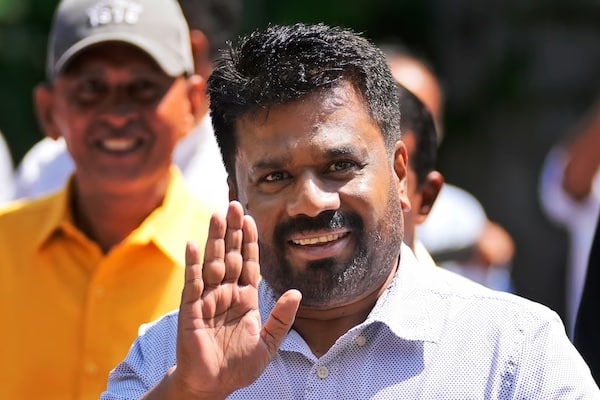Sri Lanka has its first Communist president in 56-year-old Anura Kumar Dissanayake—a historic verdict after a second round of counting, another first in the island’s presidential election history.
Dissanayake trumped his nearest rival Sajith Premadasa and the serving president Ranil Wickremesinghe after winning more than 5.63 million votes. Considering he led by 1 million votes with a 10% difference on total, the Sri Lankan Election Commision decided to declare him the winner.
It marked a spectacular turnaround as Dissanayake had won a mere 3% of the vote in the last presidential election in 2019. He is set to take oath on Monday according to PTI.
The Marxist Janatha Vimukthi Peramuna (JVP) leader’s campaign was built on sweeping reforms, tackling corruption and ensuring economic relief.
In short, Dissanayake offered a political revolution through the ballot.
Dissanayake hails from Thambuttegama, in the North Central District of Anuradhapura.
In his own words, “an aspirational youth who wanted to change the world,” the man who will be President has consistently claimed that only a massive political transition can help Sri Lanka dig itself out from the current morass. A core value in this is to empower the island’s majority—the working class, the rural folks—who have no say in political decision making.
The son of “working class parents” as he describes himself, Dissanayake attended two public schools in his hometown, and was the first student from Thambuttegama to enter university. His involvement with student politics saw him join the Marxist Janatha Vimukthi Peramuna (JVP) in 1987. Soon he was fully absorbed in JVP politics.
A bright student, Dissanayake entered the University of Peradeniya but had to leave as threats mounted. In 1992, he got himself transferred to the University of Kelaniya and graduated in 1995 with a Bachelor of Science degree.
Dissanayake has been steadfast in his criticism of cronyism, nepotism, concentration of power and corruption.
In parliament and outside, Dissanayake has been a strong anti-corruption voice demanding accountability.
His promise to overhaul the system, end family rule, introduce financial reforms and improve governance structures resonated with the protesting masses, who wanted to end the Rajapaksa brand of politics.
Dissanayake’s oft-repeated key public pledges include the recovery of stolen assets and punishing those responsible for the island’s unprecedented economic crisis.
As our contributor Dilrukshi Handunetti wrote, the rise of Dissanayake will spell a complete overhaul—one that will effectively end the Sri Lankan elite’s hold on politics and possibly grand corruption.
Congratulations @anuradisanayake, on your victory in the Sri Lankan Presidential elections. Sri Lanka holds a special place in India's Neighbourhood First Policy and Vision SAGAR. I look forward to working closely with you to further strengthen our multifaceted cooperation for…
— Narendra Modi (@narendramodi) September 22, 2024
India and Dissanayake
There have been worries expressed in some quarters that the rise of a Communist president will see Sri Lanka drawing closer to China. But that might be a misplaced fear as India has shown itself to be one neighbour which has rushed to Sri Lanka’s aid without indulging in any overt arm twisting.
“Dissanayake’s recent statement that he will cancel Adani’s projects had put the Indian high commission in Colombo in a tizzy. But given the geopolitical realities, he will indeed have to work with India,” an expert said.
The expert cited Dissanayake emphasizing his desire during the presidential campaign to continue having a good relationship with India as proof.

